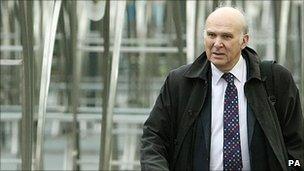Telegraph undercover Lib Dem story 'broke press rules'
- Published

The PCC ruled the newspaper had launched "disproportionately intrusive attention".
The Daily Telegraph breached rules on the use of subterfuge when it sent reporters to secretly tape Lib Dem ministers, the press watchdog says.
The Press Complaints Commission said MPs were asked a series of questions to establish "on which subject they might say something newsworthy".
The Telegraph denied it was a "fishing expedition", arguing it had acted upon information "from multiple sources".
Vince Cable, one of the ministers recorded, said he was "delighted".
'Intrusive'
He told the BBC: "My main concern, as one of the ministers involved, was that we have been personally vindicated and that the relationship between members of Parliament and their constituents, the privacy and confidentiality of their relationship, that's been preserved."
Business Secretary Mr Cable was stripped of his responsibilities to rule on Rupert Murdoch's bid to take control of BSkyB, after being recorded telling reporters he believed were constituents: "I have declared war on Mr Murdoch and I think we are going to win."
The comments were recorded by two female reporters posing as constituents with benefit problems.
The Press Complaints Commission, in its ruling, external, said the revelation had been "in the public interest" - but noted that the Telegraph itself had not run that story in its first day of stories on Lib Dem ministers.
The quotes about Mr Murdoch were instead leaked to the BBC's business editor Robert Peston by someone he said was upset that the Telegraph had chosen not to publish them, allegedly for commercial reasons due to Mr Cable's role in the BSkyB decision.
The newspaper firmly rejected this claim, insisting it had planned to publish further extracts from the secretly recorded tapes in the days ahead.
Other Liberal Democrat MPs secretly recorded by the paper's reporters, at meetings with their constituents, included Employment Relations Minister Ed Davey, Pensions Minister Steve Webb, Scottish Secretary Michael Moore, Transport Minister Norman Baker and Health Minister Paul Burstow.
The PCC received about 200 complaints after the stories were published in December, Commons Leader Sir George Young said the undercover methods used "risks prejudicing the relationship between a member of Parliament and his constituent at his advice bureau".
The PCC ruled the newspaper, having received "broad assertions of party-wide disquiet", focused "what amounted to disproportionately intrusive attention" on a number of ministers.
It ruled that while the Telegraph acted with "legitimate intent" it did not have sufficient grounds to justify sending its reporters in, and would issue fresh guidance over the acceptable use of subterfuge.
The Telegraph told the PCC it had acted on specific information from politicians and others - including from a private meeting between its editor and a Conservative cabinet minister at the Conservative 2010 party conference - that the public and private views of some Lib Dem ministers were "increasingly at odds".
But the watchdog said the initial evidence was insufficiently strong to warrant the level of intrusion.
Clandestine devices
It said the ministers concerned were asked "to comment on a series of policy issues with the evident intent of establishing on which subject they might say something newsworthy".
PCC director Stephen Abell said: "The commission has consistently ruled that 'fishing expeditions' where newspapers employ subterfuge and use clandestine devices without sufficient justification are unacceptable.
"The issue of how journalists make use of subterfuge deserves scrutiny, and indeed goes much wider than the Telegraph's actions on this occasion.
"The PCC takes this subject seriously and will issue further guidance on this area with a view to ensuring high standards across the industry."
The Telegraph argued that its subterfuge had been "kept to a minimum and was proportionate" and its inquiries were undertaken, in line with the PCC code, with - "a reasonable expectation that some legitimate public interest would be served".
Telegraph editor Tony Gallagher said the PCC recognised it had acted with "legitimate intent" and there was "broad public interest" in the unity of the coalition government.
But he said he regretted the fact the watchdog did not agree that the use of subterfuge had been necessary.
"Our revelations led to the demotion of a member of the cabinet, apologies from a string of junior ministers and condemnation from their party leader. The journalists involved in this investigation were nominated for prizes at the industry's most prestigious awards ceremony.
"While we accept the judgement, we fear the PCC's adjudication has alarming implications for the future of investigative journalism.
It increases the obstacles facing newspapers wishing to carry out legitimate inquiries based on material which is often by its nature incomplete - and it limits their ability to expose matters of legitimate public interest which those in positions of power would rather shield from public view."
Clause 10 of the Editors' Code of Practice bars the obtaining or publishing of material "acquired by using hidden cameras or clandestine listening devices".
Engaging in misrepresentation or subterfuge "can generally be justified only in the public interest and then only when the material cannot be obtained by other means", it states.
- Published21 December 2010
- Published14 April 2011